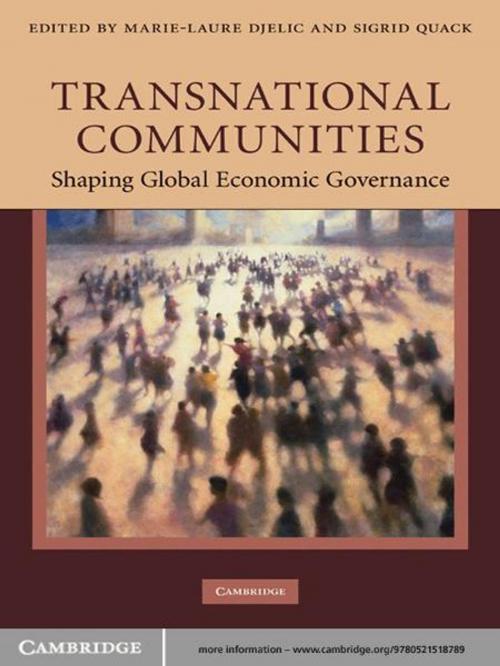Transnational Communities
Shaping Global Economic Governance
Business & Finance, Human Resources & Personnel Management, Organizational Behavior, Nonfiction, Social & Cultural Studies, Social Science| Author: | ISBN: | 9781139084079 | |
| Publisher: | Cambridge University Press | Publication: | May 20, 2010 |
| Imprint: | Cambridge University Press | Language: | English |
| Author: | |
| ISBN: | 9781139084079 |
| Publisher: | Cambridge University Press |
| Publication: | May 20, 2010 |
| Imprint: | Cambridge University Press |
| Language: | English |
Transnational communities are social groups that emerge from mutual interaction across national boundaries, oriented around a common project or 'imagined' identity. This common project or identity is constructed and sustained through the active engagement and involvement of at least some of its members. Such communities can overlap in different ways with formal organizations but, in principle, they do not need formal organization to be sustained. This book explores the role of transnational communities in relation to the governance of business and economic activity. It does so by focusing on a wide range of empirical terrains, including discussions of the Laleli market in Istanbul, the institutionalization of private equity in Japan, the transnational movement for open content licenses, and the mobilization around environmental certification. These studies show that transnational communities can align the cognitive and normative orientations of their members over time and thereby influence emergent transnational governance arrangements.
Transnational communities are social groups that emerge from mutual interaction across national boundaries, oriented around a common project or 'imagined' identity. This common project or identity is constructed and sustained through the active engagement and involvement of at least some of its members. Such communities can overlap in different ways with formal organizations but, in principle, they do not need formal organization to be sustained. This book explores the role of transnational communities in relation to the governance of business and economic activity. It does so by focusing on a wide range of empirical terrains, including discussions of the Laleli market in Istanbul, the institutionalization of private equity in Japan, the transnational movement for open content licenses, and the mobilization around environmental certification. These studies show that transnational communities can align the cognitive and normative orientations of their members over time and thereby influence emergent transnational governance arrangements.















